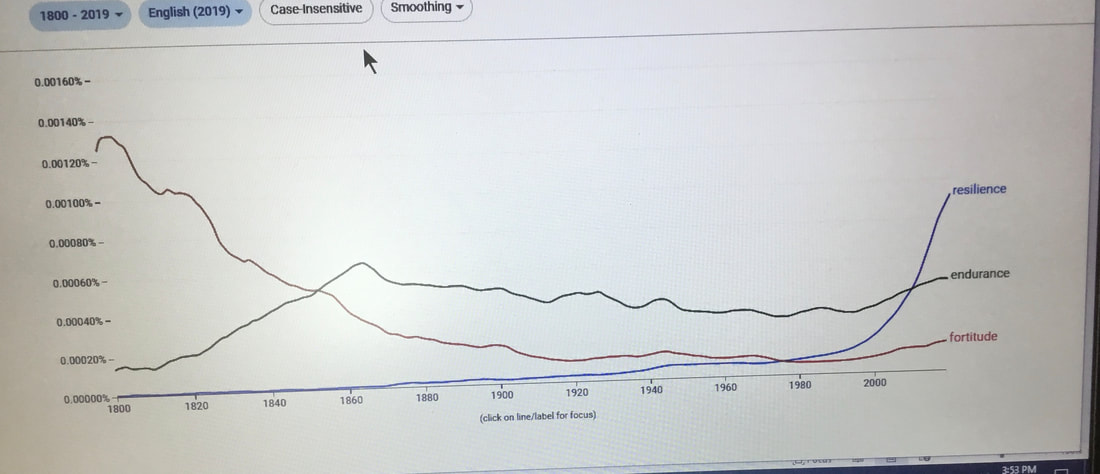
This site makes it possible to track the frequency, year by year, of words in books printed in English from early printing press days to the present. So enter fortitude ,endurance, resilience for the period 1800 to 2019 (the most recent year available).
The result will resemble the crude screen shot above.
On the right, in descending order you will see resilience, endurance, and fortitude. Around 2000 “resilience” takes off, outpacing old favorites. It’s a true millennial.
It’s best not to rely too much on an Ngram, but this one helps explain why in an earlier posting on this blog we found it so difficult to identify an equivalent in ancient Greek. There are good approximations for fortitude and endurance, but nothing quite like resilience. How could there be? The word and the concept behind it are almost brand new.
Sometimes ordinary language senses and responds to change more promptly than pundits and scholars. It’s worth paying attention, then, to shifts like the one shown in the Ngram.
Resilience is a millennial word, a new name for a new virtue. It resonates in a time when the economy has a bipolar disorder, when racism seems here to stay, when climate change delivers punch after punch, when relationships have a hard time blossoming into love. When stalemate, failure, rejection seem the norm, you have to learn to bounce back and learn from past setbacks. Resilience becomes the name of the game.
Some of the momentum for talking so much about resilience comes, I suspect, from pop-psych. But Harry Kavros has pointed out to me in an email that it is now a favorite term in discussions of business management, for example Diane L. Coutu’s article “How Resiience Works” in the Harvard Business Review. for May 2002. In such settings Thomas Edison becomes a paradigm – year after year trying different ways of developing a workable electric light bulb. Fizzle. Try again. Fizzle. Try again. He had resilience even though he didn’t have a word for it.
Edison may be a useful role model for millennials trying to escape from wage slavery, but is there anything in all this resilience talk of interest to the classicist or the historian? Here’s one line of inquiry – a route worth exploring: So far most of the resilience-talk has been about individuals, as if it applied only at the personal level. Can the term also be useful in the study of institutions, communities, whole societies? Are there, for example, truly resilient states, ones that bounce back from defeat or disaster, and end up stronger than before, while others can’t pick themselves off the ground after a war or a revolution?
What do you think?
May 29, 2021